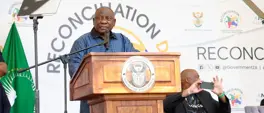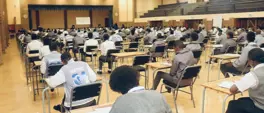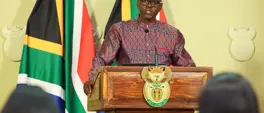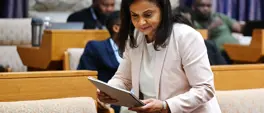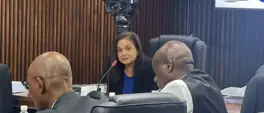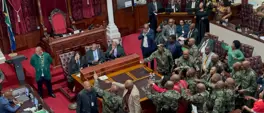YONELA DIKO: The honeymoon is over for the EFF
Yonela Diko
12 November 2024 | 7:02As expected, the EFF honeymoon began to fade with the removal of Zuma, entering a country engulfed by Ramaphoria. But the party faces many other challenges, writes Yonela Diko.
The founding of the Economic Freedom Fighters (EFF) in 2013, at the height of the African National Congress (ANC)'s unpopularity led by its scandalous erstwhile leader Jacob Zuma, gave the party a purpose and a clear mission with an unmatched public and media sympathy.
The EFF was therefore spared much of the baptism by fire that most new parties must endure, saving them the tough early years that test parties’ endurance and survival.
The level of media scrutiny that Julius Malema had to bear during his tenure as ANC Youth League President was suddenly replaced by a media honeymoon, and months and even years of positive coverage as the ANC dug deep in its defence of its indefensible leader.
For five years, the EFF was the only show in town. While they fought Zuma in Parliament on social media platforms and the streets, they may have missed the obvious fact that Zuma was their meal ticket, a reason for their united purpose and relevance.
Their fight with him was a double-edged sword, a fight that gave them popularity and growth on one hand, but one which if they won, would also signal the end of their relevance.
As expected, the EFF honeymoon began to fade with the removal of Zuma, and him being replaced by Cyril Ramaphosa.
Suddenly, the country was engulfed by Ramaphoria and almost all opposition parties began to scramble to the bottom of the barrel to look for purpose.
The old modus operandi of disruption and howling began to lose public sympathy.
While the EFF occasionally found its bone to chew and some rhythm as Ramaphosa also proved to have his flaws over time, things were just never the same.
The founding of the EFF contrasted starkly with the founding of the ANC, a movement founded on the eve of World War I, a few years before the founding of the communist party of South Africa.
Two events pitted the founding fathers against one another, with Langalibalele Dube and Sefako Magatho, the first two-party presidents, accused of betraying the struggle by calling for a suspension of criticism of the British empire during the war.
Then, JT Gumede, the fourth president, was removed for coddling communists and Pixley Ka Seme almost destroyed the party through what many called an extravagance of his genius, the ANC experienced all the challenges of forming a new party and clashes of large personalities early in its existence.
Through it all, the ANC endured.
The EFF, however, is only getting its baptism by fire now. Will it endure or will it disintegrate, wither and die?
EFF POLITICAL CHALLENGES
The first challenge with the EFF is dynamic leadership change.
Unlike the ANC, which had had four presidents by the time it clocked its 18th year of existence, with all founding fathers taking over at different times for different reasons, if the EFF next conference oelects Julius Malema as president, then by the time party clocks its 18th year of existence, it would have been led only by one of its founding members.
The ANC benefitted from its equally capable leaders who made way for one another as prevailing realities on the ground shifted demanding different leaders with different temperaments.
The EFF has been unable to benefit from the different gifts and skills of its different founding members. But political realities in the country kept changing, requiring different leadership styles.
The second challenge which the EFF must confront and appreciate is the difference between party members and party supporters, something even the ANC had to learn the hard way.
While party members have higher levels of loyalty, and some may even seat in Central Commands and conferences, it is the supporters that give you political power, and their levels of loyalty are not very high.
Supporters turn to focus on specific causes a party champions, and sometimes turn to identify with specific leaders within that organisation.
For example, there are supporters who feel Malema is abusive towards Mbuyiseni Ndlozi, while some members are defending Malema as their party leader. Malema may feel his way of dealing with the Ndlozi matter has the support of his party members. Unfortunately, it is supporters that give parties political power, and if Malema does not acknowledge their concerns and be more sensitive in handling Ndlozi, he may ultimately be left with only a room full of party members, but a country without supporters.
The third challenge for the EFF, which the party should be spending more time on instead of the clash of egos and personalities, is how the party differentiates itself ideologically from the uMkhonto weSizwe Party (MKP) and other left-leaning parties. Why should anyone join the EFF now, instead of the MK Party?
This is important because the current cannibalisation of the EFF by the MKP is based on a perceived sense that the latter is more left of the left parties, being led by the so-called father of radical economic transformation.
If the EFF loses the ideological battle to the MKP, the end may well be on the horizon.
Ultimately, what kills most political parties is the lack of transparency with finances, and a lack of accountability when inaccurate financial records are presented.
The earlier party members who left, like Kenny Kunene and Andile Mngxintama, complained about a lack of transparency in party finances. The MK Party is likely to suffer a similar fate if the rumours about the way it handles its finances are true.
People can only tolerate the opulence of its leader for so long while members and volunteers are struggling.
The challenges the EFF is facing is not new. Leadership contestations that sometimes threaten to split the party and the exodus of prominent members are challenges that should be expected from any political party.
What is important is how the party handles these challenges. For now, Malema is doing a terrible job. And his expressions are not well considered.
These are maturing pains that need an even-headed leader who can take the hit with calmness and a positive frame of mind.
Thanking those who leave your party for their selfless service is the best route. Encouraging those who stay to work harder to fulfil their call to the people doesn’t.
In the end, Malema will either leave the Presidency of his party a hero, or stay long enough to become a villain. The latter seems most likely.
Yonela Diko is the former spokesperson for the Minister of Human Settlements, Water and Sanitation.
Trending News
More in Opinion

12 December 2025 15:34
CHARLES MATSEKE | The Republic of commissions arrives at its point of no return

12 December 2025 14:15
REBONE TAU | Ekurhuleni needs bold, decisive leaders to reverse years of capture

12 December 2025 05:13
MANDY WIENER | Searching for a superhero with a spine of steel: Why the position of NDPP matters so much



